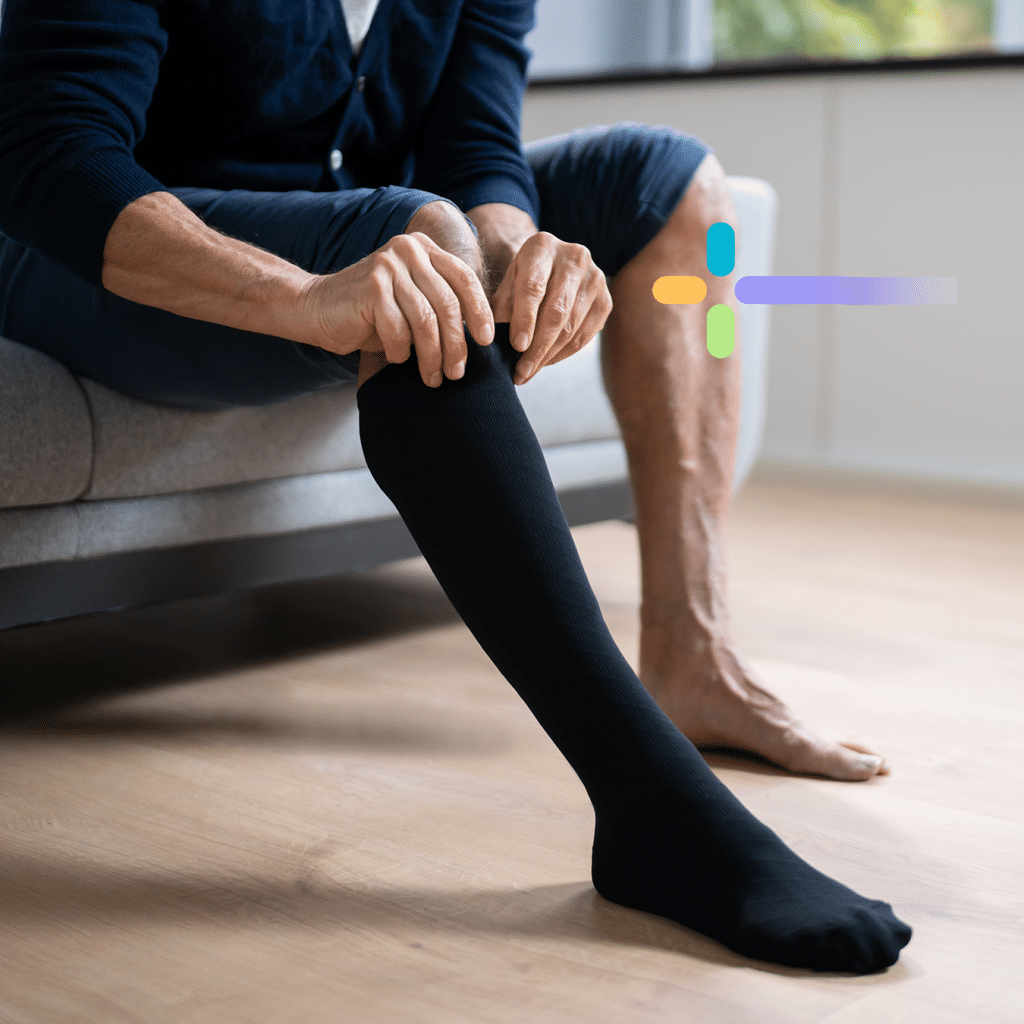Tired, achy legs wanting relief? Try Compression Socks!
May 26, 2023

Have you ever spotted someone wearing compression socks or hose and wondered why they’re wearing them? One reason may be that the person is at risk of developing a potentially serious condition called Deep Vein Thrombosis (DVT). Other people — like those whose work involves standing or sitting for long periods, those who take air travel, athletes, and pregnant women — also find there’s a benefit in wearing compression socks or stockings.
What is DVT?
Deep vein thrombosis (DVT) is a serious condition in which a blood clot forms in a deep vein inside your body. This typically occurs in the thigh or lower leg but can also develop in other areas of your body. DVT can also cause a pulmonary embolism, a potentially life-threatening condition. This is where a blot clot travels from the leg up to a lung, potentially blocking the flow of blood to the lung.
Did you know that many cases of DVT have no noticeable symptoms? If symptoms do appear, they may include pain and tenderness in the leg, and swelling in the calf muscle, ankle, foot, or thigh — typically in only one leg. In some cases, the skin in the affected area may feel warm and appear red.
How does Compression Help?
One way to reduce the occurrence of DVT is by applying gentle pressure to your legs and ankles. Compression hose (socks and stockings) help to improve blood flow from your legs to your heart and prevents blood from pooling in your leg veins, reducing the risk of clotting.
Who Might Benefit from Compression Socks?
Long Hours Sitting and Standing: Compression socks can benefit people who spend a lot of time on their feet or those who have varicose veins. By providing support to the veins and improving circulation, compression hose can reduce swelling and pain in the legs.
Air Travel: When on a long flight, your legs can become swollen and achy due to lack of movement and low cabin pressure. By applying gentle pressure to the legs, compression socks/stocking help to improve circulation and reduce swelling, making your legs feel more comfortable during the journey and less fatigued by the time you arrive at your destination.
Exercise: When you exercise, your muscles generate lactic acid, which can cause soreness and fatigue. Compression socks help to increase blood flow to the muscles, flushing out lactic acid and reducing muscle soreness. Athletes of all ages wear compression socks to improve their blood flow and oxygen delivery to help enhance their athletic ability.
Recent Surgery and Bedrest: If you’ve recently had surgery or require a long period of bed rest, your doctor may recommend compression socks or hose to improve circulation and reduce swelling in your legs.
Pregnancy: The extra weight and hormonal changes associated with pregnancy can lead to increased pressure on the legs. This can cause swelling and discomfort in the legs and feet, and in some cases, lead to the development of varicose veins or blood clots. By applying gentle pressure, compression socks/stockings help to improve blood flow and reduce swelling. Compression hose is often recommended for pregnant women, particularly those who are on their feet for extended periods of time or who have a history of blood clots or varicose veins.
At Well and Truly Pharmacy in Edmonton, we offer a wide range of compression socks and stockings. They come in different colours, styles, lengths, and thicknesses. You can also come in to measure for custom-fit stockings. So, the next time you’re prepping for a workday of sitting or standing, a long flight or gearing up for a run, slip into a pair of compression socks or stockings and feel the difference. Your legs will thank you.
Well and Truly Rx offers the best prices in Edmonton for compression socks. Book your appointment to get custom-fitted today.
Sources: Healthline, Care-Med, Revere Health
The content on this website is for informational purposes only. No material on this site is intended to be a substitute for professional medical advice, diagnosis, or treatment. Always seek the advice of your physician with any questions regarding a medical condition or treatment, and before undertaking a new health-care regimen.